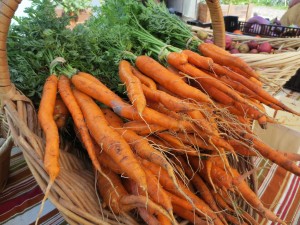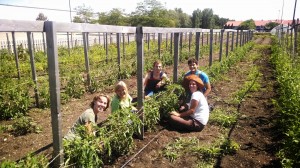 July 14, 2014 by Joshua Banner
July 14, 2014 by Joshua Banner
I’ve been involved with Eighth Day now since Jeff’s first season in 2010. I served as team leader when we were just a committee and became the farm board chair when we officially formed a not-for profit.
As we prepare for the Farm to Fork next Tuesday, and as I reflect back on my time with the farm, I ask myself questions like, Why have I been doing this? Why did I agree to plan this Farm to Fork event this year? What do I believe in?
Trying to explain the significance of Eighth Day Farm is like trying to help someone become intimately acquainted with the root structure of a tree, its many branches and leaves as well as the fruit it produces. I believe in the farm and care about it deeply because it is a vibrant witness to the beauty and wonder of God while it also addresses a myriad of specific social concerns. I am convinced the farm is one of the most substantial representations in our community of what Jesus meant when he said “the kingdom of God is a mustard seed.” You start with little, a seed, a rhizome, your first attempt at making a meal out of kohlrabi or rutabaga and then five years flashes by and your diet has changed. Your love for fresh, well cared for vegetables is richer and immediate. Food becomes better cared for, elegant, nutrient-dense, flavored, fragrant and textured. Daily meals become more significant when eating is more of an event rather than an inconvenience. You have foods and dishes to learn about and to enjoy and especially to share with others. And you want others to know this hard earned, definite relationship with vegetables, with your farmer and with the gardens. You want them to know how this food has helped you live with more definition, care, elegance, flavor, aroma and texture.
 After all, what more substantially defines us, changes us, heals and sustains us than what put into our mouths each day? This is not something to be taken lightly or for granted. Eating locally grown food is a serious and yet also a delightful discipline.
After all, what more substantially defines us, changes us, heals and sustains us than what put into our mouths each day? This is not something to be taken lightly or for granted. Eating locally grown food is a serious and yet also a delightful discipline.
As a philosophy student, I want to say geeky things like, I believe in Eighth Day Farm because it is REAL when so much of the contemporary culture that surrounds me is vague, floppy, weightless, banal, and vapid. I believe in Eighth Day Farm because I need regular and direct access to something REAL like the reality of our growing spaces, the sweat of our farmers, the health of our dirt, the diversity of our vegetables, the mystery of our weather systems that let some veggies grow and others struggle each season, the joy of our CSA members that I see each week when I pickup, and the importance of our larger mission to get this food into the hands of those who cannot afford it.
There is an abundant reality hidden in the small things, the seeds, the little efforts. Through Eighth Day Farm I’ve seen these small things expand into much more, a life-long commitment to better care for our bodies, the earth, our neighbors and community.
Introducing you to Eighth Day Farm happens through sharing food with you, either in the labor or the joy, by working together to pull suckers off tomato plants or by cooking up those tomatoes and sitting down to eat. The farm represents a set of values that like most things, are best caught rather than taught.
I invite you to read though some of the further ideas that inspire me about the local food movement and Eighth Day Farm below. These are my ideas and don’t necessarily represent the whole of the farm. This past winter the board did agree on our new mission statement, “…to love the earth, our food and our neighbors.” My thoughts below can be summed up in that statement. And remember love is no flowery, romantic ideal. Love is a verb, it is hard work that should be convicted yet careful, deliberate yet tender, passionate yet wise…just like Jeff Roessing, our founder and farm manager!
I also invite you to break bread with us. Please consider joining us July 22 at 6pm for the Farm to Fork 2014. It will be a celebration of all these things and hopefully much more to come as the farm becomes a long-term, reliable entity in this community.
I believe in Eighth Day Farm because (okay, this is long but humor me as a resigning board president)….
Eighth Day Farm is about redemption:
- If you visit our growing locations and begin to understand what Jeff is doing, your mouth should drop to the ground. None of what he has done—none of what he has grown—none of this should be happening. The work of the farm is both deeply essential for our holistic health (community, economic, land and personal health—see below) and it is also extravagant and gratuitous.
- Redemption is not just about making something work pragmatically. Redemption is about setting something to flourish beyond our imaginations. God not only heals us of our wounds. He transforms us into his likeness. The farm is an outward manifestation of the extravagant richness of what God has in store for us.
- Churches, worshipers, members of the Holland community, neighbors…all of us need physical manifestations of God’s mind-boggling, stunning, redemptive work. We need to eat from it, work along side it, celebrate, love and admire it as God’s extravagant blessedness.
- Eighth Day Farm, Jeff Roessing and his crew, they give me this kind of Gospel hope that in the face of all the brokenness, beautiful, redemptive things are happening in our world.
Eighth Day Farm is about rich joy and gladness:
- The extravagance of the food has a direct and daily affect on our ability to enjoy each day.
- Much of the reasoning and rationale behind local foods is inspired by the diversity of foods and the rich flavor of local food.
- Many of us struggle to enjoy healthy vegetables because we have grown bored with peas and carrots by themselves. Local foods give us access to a joyful, abundant journey to rediscover how delicious vegetables are.
Eighth Day Farm is about giving resources away:
- Eighth Day gives over 10% of its food away to under-resourced families through a partnership with Community Action House.
- Eighth Day has conducted several community workshops, hosted school field trips and has now begun a pilot Backyard to Table program teaching six families to grow their own food. Eighth Day farm wants to keep giving food away and teaching people to grow food.
- The farm is also committed to training future growers and food advocates through its Residential Summer Practicum. The experience focuses on the integration of agrarian skills and spiritual formation exploring the Benedictine idea that work is prayer and prayer is work. During the summer of 2013 the farm hosted eight current or recently graduated students. This summer 2014, there are four.
- To further expand the farm’s ability to give food and knowledge away, we dream of one day renovating our Growth Center (30th & Pine Ave) location into a full fledged learning center equipped with a kitchen to host visitor and even teach cooking classes.
Eighth Day Farm & Local food is about healing the land:
- In our industrialized, big agriculture systems, approximately seven calories of fossil fuel energy is currently being spent in order to produce one calorie of food energy.
- The industrialized systems over-extend water resources, deplete soil nutrients, and contaminate our air.
- Jeff Roessing is concerned not with taking food and natural resources out of the land, but with nourishing the land so that it can flourish. As some organic farmers say, we must be about the work of growing good soil. If we can grow good soil, we can easily grow good food.
Eighth Day Farm & Local food is about shifting the economy:
- Americans spend the least money on food out of all of the developing countries in the world.
- Americans throw almost 50% of their cheap food away.
- If Americans absorbed the real cost of their food through local, organic foods, they might care more about the value and quality of their food, eat more of what they buy, and throw less away.
- Higher value for food means better care for natural resources.
- Higher value for food means more jobs, a healthier economy, and stronger food security.
Eighth Day Farm & Local food is about healing relationships:
- God created food to be shared. The higher value we have for our food in dollars means we will share it and celebrate it more intentionally.
- If there is more value in our food, meals become more substantial to families and communities. More thought, care, creativity and intentionality goes into what we eat, how we share it and who we share it with.
- The brokenness of our society falls along religious, denominational, political and many other ideological lines. Breaking bread together, sharing a good meal and even working together to grow food together while caring for the earth—the sharing of food and labor invites persons from any persuasion to come together and learn from each other. Our respective communities within our community need a venue like Eighth Day Farm to engage one another in unique ways.
Eighth Day Farm & Local food is about healing our bodies:
- When we spend more time, money, and energy acquiring our food, we pay more attention to its health benefits.
- Joining a CSA, spending more on food, growing your own food…all intentional local food practices shift your personal diet, training you in more healthy eating disciplines.
- The health benefits are, of course, innumerable for ourselves and others. For example, type II diabetes and obesity, are leading, under-acknowledged threats to mortality rates in America. These are crises of health largely affecting the poor. If we personally care more about food and personal health, chances are we will want to share this wealth with others. The farm’s Backyard to Table and its 10% food donations are beginning ways to directly shift the diets of the under-resourced. What might happen if members of our CSA and the farm itself were able to one-day partner with health professionals to identify even more substantial alternatives?
- Overall, healthier bodies means less drain on the health care system and health insurance costs.
Many have asked us, what is your product? Clearly, we grow and distribute food, so I take their real question to be, why are you special? Why are you a non-profit? As you can see, there are many answers to this. Locally grown food addresses a myriad of personal and social concerns. I’ve tried to cover a few of the reasons that matter to me above. There is so much more to say, so many more things for us to learn. If you become more involved in the farm, you can bring your values, your hopes for families and the community, your skills and passions to further shape the farm.
As I step down from the board, we need many volunteers:
- half day, full day length volunteers
- community connectors and promoters to help us do the grass roots work to spread the news
- graphic designers
- persons with business expertise like banking, finance, and accounting
- grant writers
Thanks for considering the farm. If there is any way you would want to become more involved, come taste and see!
Peace of Christ to you,
Josh


Recent Comments